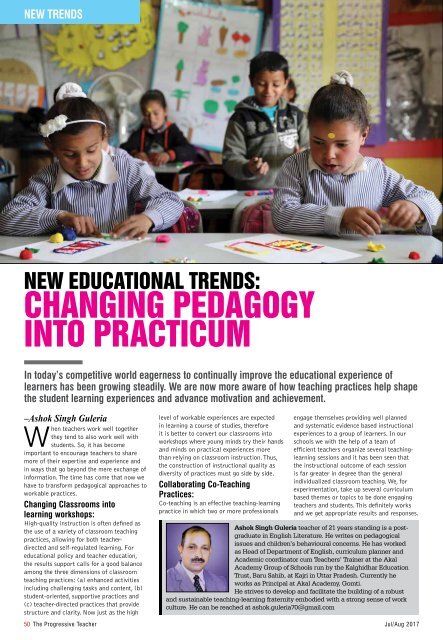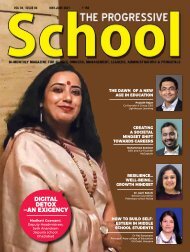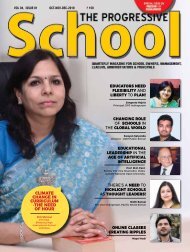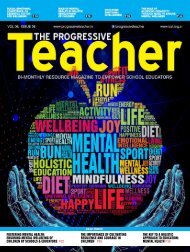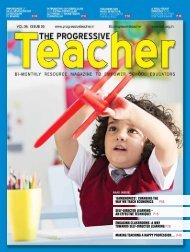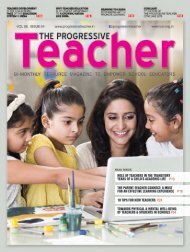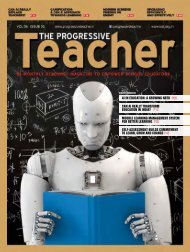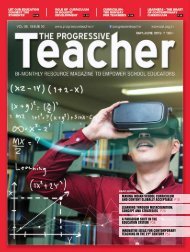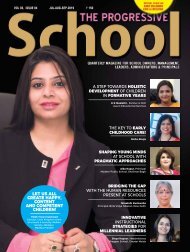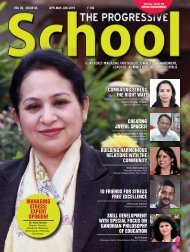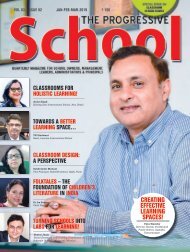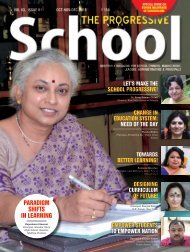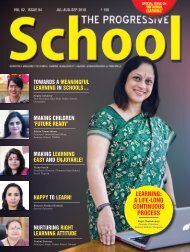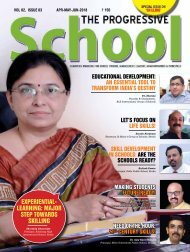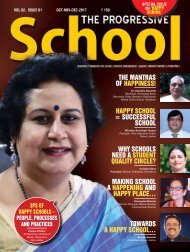The Progressive Teacher Vol 04 Issue 03
This issue of The Progressive Teacher focuses on "New Trends in Education ". In this edition, articles explore contemporary trends to enhance interactive learning amongst students.
This issue of The Progressive Teacher focuses on "New Trends in Education ". In this edition, articles explore contemporary trends to enhance interactive learning amongst students.
Create successful ePaper yourself
Turn your PDF publications into a flip-book with our unique Google optimized e-Paper software.
new trends<br />
New Educational Trends:<br />
Changing Pedagogy<br />
into Practicum<br />
In today’s competitive world eagerness to continually improve the educational experience of<br />
learners has been growing steadily. We are now more aware of how teaching practices help shape<br />
the student learning experiences and advance motivation and achievement.<br />
–Ashok Singh Guleria<br />
When teachers work well together<br />
they tend to also work well with<br />
students. So, it has become<br />
important to encourage teachers to share<br />
more of their expertise and experience and<br />
in ways that go beyond the mere exchange of<br />
information. <strong>The</strong> time has come that now we<br />
have to transform pedagogical approaches to<br />
workable practices.<br />
Changing Classrooms into<br />
learning workshops:<br />
High-quality instruction is often defined as<br />
the use of a variety of classroom teaching<br />
practices, allowing for both teacherdirected<br />
and self-regulated learning. For<br />
educational policy and teacher education,<br />
the results support calls for a good balance<br />
among the three dimensions of classroom<br />
teaching practices: (a) enhanced activities<br />
including challenging tasks and content, (b)<br />
student-oriented, supportive practices and<br />
(c) teacher-directed practices that provide<br />
structure and clarity. Now just as the high<br />
level of workable experiences are expected<br />
in learning a course of studies, therefore<br />
it is better to convert our classrooms into<br />
workshops where young minds try their hands<br />
and minds on practical experiences more<br />
than relying on classroom instruction. Thus,<br />
the construction of instructional quality as<br />
diversity of practices must go side by side.<br />
Collaborating Co-Teaching<br />
Practices:<br />
Co-teaching is an effective teaching-learning<br />
practice in which two or more professionals<br />
engage themselves providing well planned<br />
and systematic evidence based instructional<br />
experiences to a group of learners. In our<br />
schools we with the help of a team of<br />
efficient teachers organize several teachinglearning<br />
sessions and it has been seen that<br />
the instructional outcome of each session<br />
is far greater in degree than the general<br />
individualized classroom teaching. We, for<br />
experimentation, take up several curriculum<br />
based themes or topics to be done engaging<br />
teachers and students. This definitely works<br />
and we get appropriate results and responses.<br />
Ashok Singh Guleria teacher of 21 years standing is a postgraduate<br />
in English Literature. He writes on pedagogical<br />
issues and children’s behavioural concerns. He has worked<br />
as Head of Department of English, curriculum planner and<br />
Academic coordinator cum <strong>Teacher</strong>s’ Trainer at the Akal<br />
Academy Group of Schools run by the Kalghidhar Education<br />
Trust, Baru Sahib, at Kajri in Uttar Pradesh. Currently he<br />
works as Principal at Akal Academy, Gomti.<br />
He strives to develop and facilitate the building of a robust<br />
and sustainable teaching-learning fraternity embodied with a strong sense of work<br />
culture. He can be reached at ashok.guleria70@gmail.com<br />
50 <strong>The</strong> <strong>Progressive</strong> <strong>Teacher</strong> Jul/Aug 2017


